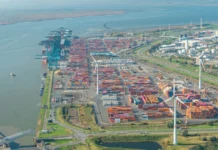
A feeder service out of Constanta in Romania has delivered the first containers since Russia’s 2022 invasion of Ukraine to Chornomorsk port in what is intended to be a regular service to the greater Odessa region.
T-Mare, a Panamanian flagged general cargo vessel owned by Marshall Islands registered Majoris Trading, was chartered on 1 February, according to VesselsValue data, by Turkish forwarder Sea Pioneer Denizcilik to operate a feeder service between Constanta and Odessa.
The vessel made its first call, carrying Maersk cargo, into Ukraine on 3 April and the ship, which has a capacity for 373 TEUs nominally, with 40 reefer plugs, is expected to complement Danube River container services, expanding Ukraine’s ability to import and export vital cargoes, including grains, metals and chemicals.
The ship entered Chornomorsk on the afternoon of 3 April and made its return journey to Constanta on the same day. Ukraine opened its ‘safe corridor’ following Russia’s decision not to renew the grain corridor agreement in the summer of last year.
Daniil Melnychenko, an analyst with Ukrainian consultancy Informall BG, told Container News: “Up to now, container transportation has been carried out to a limited extent through the Danube ports, but from today it will increase significantly.”
He added that in March, the Deputy Minister of Infrastructure Yuriy Vaskov had announced that all five greater Odessa region container terminals were ready to process containers, but they will resume work in stages.
“The traffic was supposed to start with the feeder ships, and container lines would follow them in the absence of incidents,” said Melnychenko.
Shippers and forwarders are struggling to achieve their cargo handling targets on the limited and comparatively slow river barge services that currently handle container cargo. However, Melnychenko expects container lines will utilise the feeder service if it proves safe.
Russia’s military was opposed to the use of containers for the controlled corridors because they feared that arms and equipment for the war effort could be smuggled into Ukraine.
Since last year, however, Russian navy operations in the Black Sea have been curtailed by Ukrainian military successes and this latest move may be seen as an extension of those successes.
Russian military activity in recent times has targeted port infrastructure with container handling equipment as a particular target.
Maersk, which, along with the Turkish carrier Akkon Lines, are the only container lines to have continued to handle containerised cargo on the Danube River using rail and barge operations by Maersk and Akkon uses coasters, barges and a cellular vessel, and are both expected to utilise the feeder service.
On the vessel’s first voyage the containers on board the T-Mare were said to be almost exclusively Maersk boxes.
Melnychenko expects a second vessel could be added to the service in the future if the initial operations are successful.
Mary Ann Evans
Correspondent at Large




